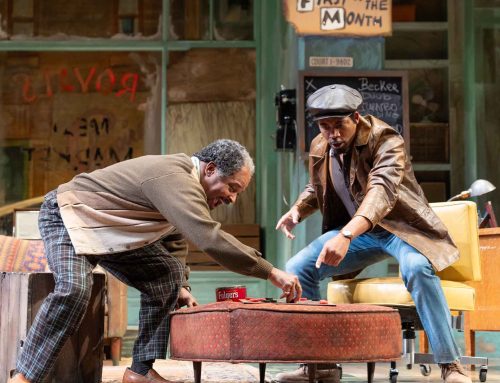Romeo and Juliet
by William Shakespeare
In Director Laird Williamson vision, Romeo and Juliet is a farcical melodramatic moral play filled with bawdy clowns. It’s a slapstick tragedy, a category underrepresented on modern stage. The script’s only fault is the pesky obvious rhymes and flowery language that can be best gotten through in a quick pace at high volume.
Williamson has ordered up so many pelvic thrusts for the hormonal young men that the show is unsuitable for school tours. What in other productions comes off as witty sexual innuendo, Williamson unmasks as full-on, lowest-common-denominator sleazy talk. He gets the audience giggling at the sex, tittering at the over-wrought emotions, and focused on the comic characters of nurse, friar, and apothecary.
Williamson sets the production in mid-1800s California, makes the warring families Hispanic, substitutes an American general for Verona’s Prince, and adds an unpredictable sprinkling of Spanglish to the text. The result is a perfect mixture of Ugly Betty lines and Justified’s Harlan County clan characters. Toward the goal of Hispanicfication, Williamson has given permission to each actor, except for the two American military men (Prince and Paris), to create their own version of a foreign accent. Some players picked Tex-Mex, others Castilian, a few had none, and the most creative was the African-like clip of the nurse. Of course, the strength of the accents varied from scene to scene, and generally disappeared when there were too many of those bothersome poetic stanzas piled up together. Let’s mention voice and text director David Carey here; should this misalliance of sounds be credited to Williamson alone or should Carey share the responsibility?
Early on, I started watching the audience to find out who was laughing. The younger members of the opening-night audience, probably those who had never seen R&J before and may have never read it, were the most likely to guffaw outright at the overblown on-stage dramatics that unfortunately supplemented the clownish lines Shakespeare did write. Those newbies no doubt walked away from the evening wondering why R&J is considered a classic. They have good cause. What is at Oregon Shakespeare Festival this year is no masterpiece. It’s an illogical story that lurches from teenage sex humor to an over-the-top, unrealistic, contrived tragedy that is utterly fake.
When we saw the 2002 production of Titus Andronicus, the audience was divided. I thought that Titus was a badly mishandled evening while my husband swore that Shakespeare meant the play to be a comedy. This R&J feels the same. If you didn’t walk into the theater knowing the power of R&J, you would be clueless about the depths of the story and the majesty of its words. Maybe laughter was the point Shakespeare had in mind.
Williamson made poor cutting decisions. Brief comedic or background scenes that are typically edited out were given long – if not full – runs. For example, most productions I recall don’t show Romeo buying the poison. The purchase is referred to later, and that’s enough. But, Williamson creates a pageant moment for a shaman-like apothecary to appear, create a small and unnecessary character, and throw in a distracting and irrelevant plot line. Plus, the apothecary was made a weird, snicker-producing odd person who defocused the audience’s energy in a key moment of the play. The nurse, the friar, and Romeo’s kinsmen all got more lines on topics that should be explored only when the show is going on for a full Shakespearian five hours.
The production is a massive failure spanning all crafts. Not only did the professionals have bad guidance from Williamson, most actors and designers turned in poor executions of their own.
Romeo (Daniel Jose Molina) is too easy a target. Under experienced, Molina is not yet a member of Equity, and he simply could not command the stage. He is the right age, but was callow, sniveling, and strangely, unattractive. His scenes with Juliet contained grasping embraces and desperate kisses, but they lacked emotional passion or chemistry. The balcony scene and other moments with beautiful language never jell and are instead rushed through. But, let’s go back to sniveling. Romeo cannot be a whiner. Period.
The worst characterization was Romeo’s noble friend Mercutio (Jason Rojas). Director Williamson must own this gross travesty. There is nothing honorable about Rojas’ Mercutio. Williamson directed this Mercutio as another of Shakespeare’s clowns. The character is played as a foppish, sly, sex-addled hot head. I initially was angry because I thought that Mercutio was offered as a stereotypical faggot, but then I realized his pelvic thrusts were directed at women. I was relieved that we escaped a homophobic slur. But it was an even more complete relief when Mercutio was run through in the sword fight.
Juliet’s Nurse (Isabell Monk O’Connor) is also deserving of a moment in the scorn spotlight, although I suspect that she also gave Director Williamson exactly what he asked for. This nurse is a too-loud cartoon Mammy character who escaped from The Further Adventures of Hedda Gabler. Early on her histrionics framed the story as a comic melodrama.
At the intermission we had decided that the only actor to that point who seemed worthy of their role was Juliet (Alejandra Escalante). Escalante got us to recant that judgment as she started the second act with a series of overblown, overwrought speeches that brought her back down to the other Williamson-ruined characters.
So many characters had their annoying moments on stage. From Capulet (Elijah Alexander)’s frequent but unpredictable and un-Shakespearian Spanishisms to Peter (Joe Wegner)’s comedic slavish Igor portrayal, I never felt safe from an unwanted, jarring take-me-out-of-the-play moment.
Costume designer Susan Tsu created elaborate clothes, mostly elegant, and mostly isolated from the rest of the show. Her budget must have been huge because the dresses were stunning and the men’s clothes detailed. But, why did she dress (and someone make up) the Prince/General (Rex Young) to look like Captain Crunch of cereal fame? And, in one scene Capulet is wearing a lovely paisley print jacket. Did the California Spanish in 1850 wear paisley? I truly don’t know but the piece’s appearance jarred me enough so that I started wondering. Travel, fights, and laying on concrete floors didn’t keep the characters from showing off fine party clothes in every scene. It was wrong.
The stage by Michael Ganio was reasonable when it was simple. Wooden slat walls gave a fine old California feel, and allowing the young lovers to call to each other from wall top to wall top worked okay. But, then there were the modern-looking unfinished bright-colored spikey things that were somehow in the background at the top of the set. What were they? (A friend suggested that they represented the towers of the future Golden Gate Bridge. I hope she was wrong.) And, when near the end of the play the background walls move around to give a ride to the apothecary to downstage center, the moment felt tricky and not artistic.
And, what craft was responsible for the completely awful background projections? During the balcony scene a photograph of the moon comes up that looks out of Sky and Telescope, and that’s where the other pictures of a starry night and dawn look like they’re from, too. The moon captured by a magnification-obsessed astronomer isn’t at all romantic looking, and an 1850’s night’s sky cannot be represented by a close-up of a small group of stars snapped by the Hubble telescope. Some of the other photographs shown are merely unobtrusive, a random tree branch or background pattern. But, really, the scientific sky shots are just out of place.
Fight Director U. Jonathan Toppo gets my only unqualified “Bravo!” The sword play was athletic and exciting. Those scenes were worth watching, especially from the front of the theater where you wonder for your own safety how controlled those slashes really are.
So, what do I really think? This R&J was so bad that I feel angry at the director. He robbed a great play of its meaning, ignored its poetry, and paid no attention to cohesion along the way. This is a production unworthy of a professional theater company.
Ozdachs Rating: ![]()






A View from an Alternative Universe
The local reviewer apparently saw a different play.
http://www.mailtribune.com/apps/pbcs.dll/article?AID=/20120226/NEWS/202260320
Re: Hmmmmm
Thanks for the comment. My recollection of this production remains completely negative, but I am glad that some people enjoy it.